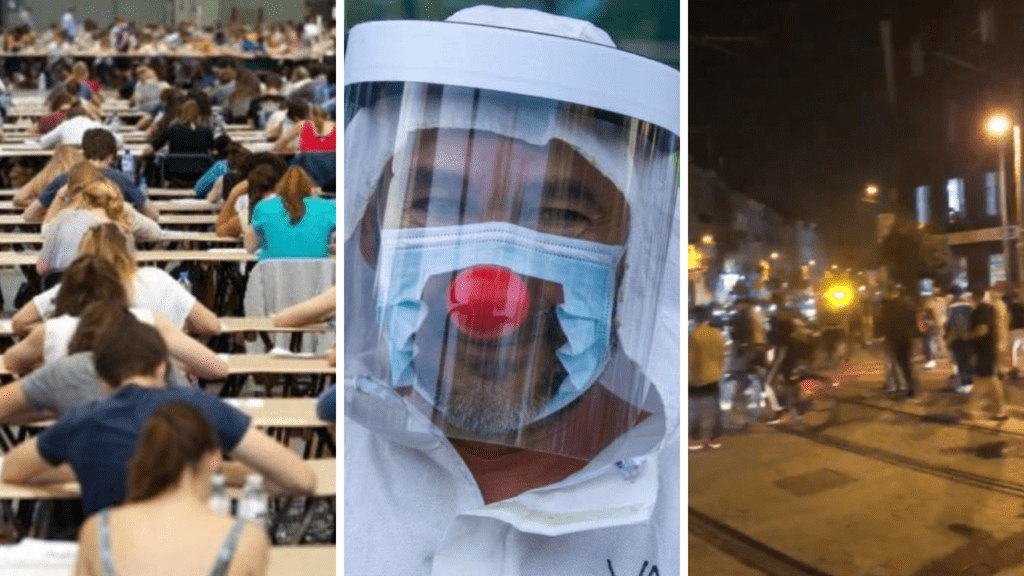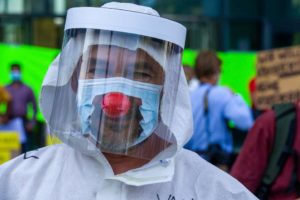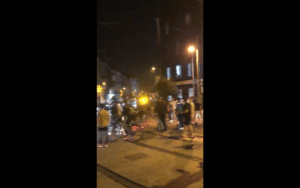As the increase in coronavirus infections in the Antwerp province seems to be under control, the figures in the Brussels-Capital Region are going up quickly.
Last week, the Region introduced the obligation to wear a face mask in public in all municipalities. However, the impact of that measure - which was introduced too late, according to several experts - will only be visible in the figures in roughly two weeks.
For now, the rise is still continuing, with an average of 122 new confirmed cases per day last week, or an increase of 48%. “The percentage of positive tests also continues to rise, as 6.7% of all tests were positive in Brussels,” said virologist Steven Van Gucht.
In the meantime, a protest against the coronavirus measures with hundreds of participants who did not wear a face mask (correctly) and did not adhere to the social distancing measures took place in Brussels yesterday, while the number of hospital admissions due to the virus continues to go up.
So, what else is happening? Travellers returning from red zones no longer have to consult a doctor to get tested, schools will open five days a week as usual from September, and two Belgian universities made it into the top 100 world ranking.
With that in mind, here are some of the top stories from around the country to get you up to speed.
1. Belgian coronavirus ‘centre of gravity’ is shifting from Antwerp to Brussels
The latest figures for the coronavirus epidemic in Belgium indicate that the Brussels-Capital Region is becoming the “centre of gravity” for infections, said health officials during a press conference on Monday.
“After a long period of increasing figures, today is the first time that we can report a decrease in the weekly average,” said virologist and interfederal Covid-19 spokesperson Steven Van Gucht.
In Brussels, however, the increase continues, with an average of 122 new confirmed cases per day last week, or an increase of 48%. “The percentage of positive tests also continues to rise. 6.7% of all tests were positive in Brussels,” said Van Gucht. “That is high.” Read More.
2. Hundreds gather in Brussels to protest against the coronavirus measures
From noon on Sunday, several hundred people gathered in front of the Finance Tower in Brussels to protest against the coronavirus measures in Belgium.
They demand, among other things, the dismissal of top virologist Marc Van Ranst, who advises the government on the coronavirus crisis, together with other experts.
Many participants did not wear a face mask, or were wearing it the wrong way, and did also not adhere to the social distancing measures. Read more.
3. Covid-19: hospitalisations and deaths continue to increase
An average of 574 people per day tested positive for the new coronavirus (Covid-19) in Belgium during the past week, according to figures by Sciensano on Monday.
The figure refers to the period from 7 to 13 August and represents a 5% reduction compared to the average of the week before. Read More.
4. Police union shares footage of uproar after arrest in Schaerbeek
The SLFP Police union tweeted video footage on Sunday of the uproar that took place during an arrest in Schaerbeek on Friday night.
A 17-year-old injured two policemen during the incident. The union also claims that one of the officers was stabbed in the back of his bulletproof vest.
“It is time the public knew how things are going in Brussels neighbourhoods,” said SLFP Police vice-president Vincent Houssin. Read more.
5. Travellers returning from ‘red zones’ no longer need to see a doctor to be tested
Travellers coming back to Belgium after staying in a red zone, and people who have been in close contact with a person infected with the new coronavirus (Covid-19) can now go directly to a centre or some laboratories for a PCR test.
They will need to present a code sent to them by text message under a new procedure, adopted on Friday, by the Belgian health research institution, Sciensano. They will no longer need to consult a general practitioner first, but are requested to do so if they test positive or develop symptoms.
Since 1 August, people returning to Belgium after being out of the country for longer than 48 hours need to fill in a Passenger Locator Form, showing their travel history. Read more.
6. Back to school: Five days a week as usual
The nation’s children and young people will resume their education from September at a normal rhythm of five days a week, the ministers from all three communities have agreed.
All schools will open on code yellow, as a result: the lowest level there is. As time goes on, the level could change to follow the medical circumstances, either within a single school or in a particular school area. Read more.
This decision not only concerns primary and secondary schools, but universities and university colleges as well. Read more about that here.
7. Two Belgian universities in top 100 world ranking
Two Belgian universities are listed in the latest Academic Ranking of World Universities (ARWU), otherwise known as the Shanghai Ranking.
The university of Ghent comes in at number 66, unchanged from last year. The university’s total score was 28.9. compared to a maximum 100 scored by leader Harvard. Ghent comes top in the world, however, for veterinary sciences.
Lower down, the university of Leuven managed to squeeze into the top 100 at number 97, down from 85 last year. Leuven scores 25.9 points. Read more.
Maïthé Chini
The Brussels Times



